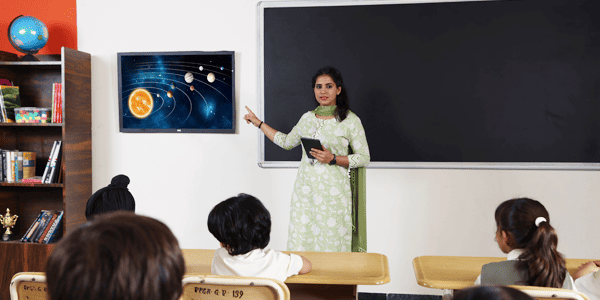Achieve Academic Success with Primary Science Tuition Singapore
Achieve Academic Success with Primary Science Tuition Singapore
Blog Article
Discover the Necessary Advantages of Recognizing Main Science for Young Learners
The relevance of main science education for young learners expands much past mere knowledge acquisition; it offers as an essential column in establishing important abilities such as vital thinking, analytical, and creativity. Engaging with clinical principles through inquiry-based and interactive activities not only grows interest however also lays the foundation for durable, confident learners.
Enhancing Important Assuming Abilities
Cultivating essential believing skills in young students is important for their cognitive advancement and future academic success. Critical thinking allows children to assess information, evaluate evidence, and make educated decisions, which are important skills in today's information-rich society. By engaging in scientific query, young students can improve these skills as they discover principles with reasoning, testing, and observation.
In primary scientific research education, instructors can assist in important thinking by motivating students to ask inquiries, create hypotheses, and conduct experiments. This hands-on approach enables youngsters to exercise problem-solving and develop sensible reasoning skills. For instance, when students investigate the residential properties of materials or the principles of activity, they find out to examine their findings critically and reason based upon evidence.
In addition, conversations and collective tasks can advertise crucial thinking by offering possibilities for students to articulate their ideas, challenge assumptions, and consider varied viewpoints. By producing an encouraging environment that values query and reflection, instructors can nurture critical believing abilities that encourage young students to come to be independent thinkers and lifelong students. Eventually, enhancing these skills lays a robust foundation for their future scholastic ventures and personal growth.
Promoting Inquisitiveness and Expedition

Main science education gives an organized environment where young students can check out various phenomena with hands-on experiments and observations. By enabling them to connect with materials and participate in inquiry-based knowing, instructors create chances for youngsters to formulate theories, examine their concepts, and attract final thoughts. Such experiences support a feeling of marvel and excitement concerning scientific research.

Structure Self-confidence in Issue Fixing
Building self-confidence in problem-solving is a vital component of main scientific research education and learning that equips young students to approach obstacles with resilience and creativity - primary science tuition Singapore. They create essential abilities in crucial thinking and evaluation when children are encouraged to engage with clinical ideas via hands-on tasks and inquiry-based understanding. This process not only boosts their understanding of scientific principles yet likewise fosters a feeling of ownership over their understanding
To construct confidence, instructors should develop a helpful environment where mistakes are checked out as possibilities for development instead of failings. This encourages pupils to take dangers and discover different services to troubles. By offering scaffolding and guidance, teachers can assist pupils navigate intricate jobs, progressively enhancing their freedom in analytic circumstances.
Furthermore, collective discovering experiences, such as team jobs or experiments, can even more boost trainees' self-confidence as they find out to articulate their thoughts and listen to others' perspectives. These communications support social skills and reinforce the concept that problem-solving is often a cumulative endeavor. Eventually, growing self-confidence in problem-solving prepares young learners for future scholastic challenges and outfits them with the tools essential for long-lasting understanding.
Motivating Imagination and Innovation
In the realm of primary scientific research education Homepage and learning, urging creativity and innovation is crucial for cultivating a vibrant discovering environment. By fostering a society where young learners can check out ideas and experiment freely, instructors assist students develop important assuming skills and an interest for discovery. Creativity in science encourages kids to ask questions, design theories, and take part in hands-on tasks that boost their creativity.
Integrating open-ended projects and inquiry-based discovering into the educational program permits students to express their distinct viewpoints and options. For example, when tasked with addressing a problem pertaining to their environment, students can conceptualize several techniques, resulting in inventive outcomes that showcase their creativity. This not just deepens their understanding of clinical principles yet additionally imparts a feeling of possession over their understanding process.
Moreover, imaginative science education nurtures partnership among peers, as pupils typically share concepts and improve one an additional's insights - primary science tuition Singapore. This collective spirit advertises not just development but also necessary social skills. Hence, by focusing on creativity and innovation in main scientific research education, we empower young students to believe critically, accept challenges, and picture possibilities, laying a solid foundation for lifelong discovering and expedition
Planning For Future Knowing Challenges
Young students' capacity to navigate future discovering difficulties hinges on a strong structure in primary science education. This foundational understanding equips students with essential believing skills and a methodical strategy to analytic, important for taking on intricate problems in an ever-evolving world. Main science fosters inquiry-based knowing, encouraging pupils to ask concerns, discover hypotheses, and take part in hands-on experiments.
As they establish these abilities, students come to be adept at evaluating information, identifying patterns, and drawing informed conclusions. Such competencies are important not only in clinical fields yet additionally in design, mathematics, and modern technology (STEM), where interdisciplinary understanding is increasingly crucial.
Moreover, key scientific research education cultivates a feeling of interest and resilience in young students, allowing them to see obstacles as chances for growth. As they come across and overcome obstacles in their clinical explorations, they construct confidence in Click Here their capacity to innovate and adjust.
Inevitably, check my blog a strong structure in primary scientific research not just prepares young students for scholastic pursuits yet also outfits them with the tools required for long-lasting knowing and versatility in a quickly transforming global landscape. By buying main scientific research education, we are investing in the future capacity of our learners.
Verdict
Comprehending primary scientific research is crucial for young students, as it fosters critical thinking, inquisitiveness, and imagination. Eventually, the benefits of key science education prepare children for future academic quests and infuse lifelong discovering practices important for flourishing in an ever-evolving globe.
The relevance of main science education and learning for young learners expands far beyond simple knowledge purchase; it serves as an essential pillar in creating vital skills such as critical thinking, analytic, and imagination. By producing an encouraging atmosphere that values inquiry and reflection, teachers can support vital believing skills that equip young learners to end up being long-lasting learners and independent thinkers. Thus, by focusing on imagination and development in main scientific research education, we equip young students to assume seriously, welcome challenges, and imagine opportunities, laying a solid structure for long-lasting learning and expedition.
Young learners' capability to navigate future understanding obstacles hinges on a solid foundation in main science education.Comprehending key scientific research is essential for young learners, as it promotes essential thinking, interest, and creativity.
Report this page